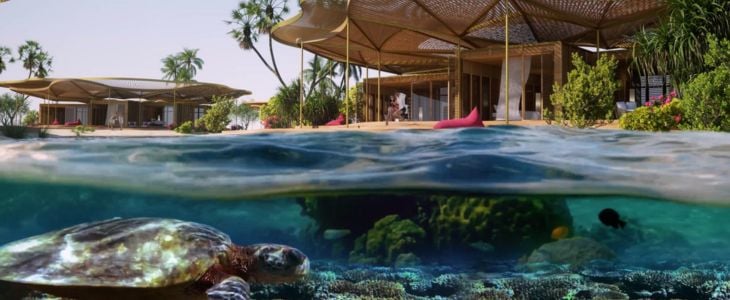Oil-free compressors and air-cooled systems represent crucial developments in implementing sustainable district cooling systems in Saudi Arabia.
As the nation grapples with substantial and increasing energy demands, the integration of sustainable district cooling emerges as a pivotal step for progress and environmental responsibility. While this is true of any country today, Saudi Arabia’s extreme weather conditions paired with their unmatched economic development presents particular challenges and opportunities for the energy sector.
Integrating energy-efficient systems not only ensures resource optimization: it also fortifies Saudi Arabia's energy infrastructure, fostering resilience in the face of dynamic energy challenges.
Beyond environmental gains, sustainable district cooling holds promise for economic prosperity. At the same time, by championing sustainable district cooling, Saudi Arabia positions itself as a steward of responsible resource management, promising reduced environmental impact, improved quality of life, and long-term well-being for its residents.
In essence, the pursuit of sustainable district cooling systems in Saudi Arabia must necessarily involve forward-looking initiatives that not only address immediate energy needs but also chart a course towards a resilient, economically vibrant, and environmentally conscious future.
This is precisely where state-of-the-art district cooling systems, with oil-free magnetic bearings compressors and air-cooled systems come in.
| Table of contents |
| What are oil-free compressors |
| What are air-cooled systems |
| The crucial junction of air-cooled systems and oil-free compressors |
| The Red Sea Global: a success scenario |
What are oil-free compressors
Oil-free magnetic bearing compressors are a type of compressor that uses magnetic bearings to support the rotating components instead of traditional lubricated bearings.
These compressors are designed to eliminate the need for oil in the compression process, offering several advantages in terms of reliability, maintenance, and environmental impact. At the same time, these oil-free compressors offer several advantages that make them interesting for air-cooled systems, especially in applications where precise control, high efficiency, and reduced maintenance are critical.
The working principle of magnetic bearings and their elimination of the need for oil in the system generates a number of advantages. On the one hand, they facilitate contactless operation. Magnetic bearings eliminate the need for traditional mechanical bearings. Thanks to the absence of physical contact, friction, wear and the need for lubrication are reduced, so that chiller maintenance is also greatly reduced and simplified.
On the other hand, oil-free compressors present an outstandingly high efficiency. Thanks to the use of magnetic bearings, oil-free compressors provide precise control over the shaft's position, allowing for optimal alignment and minimizing energy losses due to friction. This contributes to higher compressor efficiency and overall system performance.
This is also true during part-load scenarios. Thanks to magnetic bearings, which are designed to operate at variable speeds (as opposed to fixed-speed traditional compressors), these oil-free compressors can adjust their speed based on actual cooling demand, so that the system operates at an optimal efficiency level across a range of loads. For instance, LG claims their oil-free compressors can improve part load efficiency by 51% compared to fixed speed systems.
What are air-cooled systems
Air-cooled systems for district cooling refer to a type of cooling system where air is used as the heat rejection medium to dissipate heat.

As such, this type of infrastructure generates a number of advantages, such as a simplified design as opposed to water-cooled systems with cooling towers. At the same time, water conservation lies at the heart of these systems. Since there is no need for cooling towers or additional water for the heat rejection process, air-cooled systems can be more water-efficient. This makes them particularly suitable for regions where water scarcity is an issue.
The crucial junction of air-cooled systems and oil-free compressors
As we’ve mentioned above, employing air-cooled systems with oil-free compressors is a strategic and efficient choice for district cooling in Saudi Arabia, offering a range of benefits that align with the country's climate, energy landscape, and sustainability goals.
First of all, they can adapt well to Saudi Arabia’s predominantly arid climate, which also presents high ambient temperatures. In this context, air-cooled systems are well-suited, as they don't rely on water for cooling. This approach aligns with water conservation efforts in a region where water resources are precious, a move that is particularly important for responsible resource management in the area.
Secondly, these systems present a reduced environmental impact and improved energy efficiency, which are both in line with global sustainability initiatives and Saudi Arabia's commitment to reducing its environmental footprint.
At the same time, oil-free compressors are able to lower energy consumption and operational costs over the long term, making it a win-win scenario. As the elimination of oil in the compression process reduces the maintenance requirements (from oil changes, to filter replacements, and other tasks), there are lower operational costs and increased system reliability to be celebrated.
Finally, the use of air-cooled systems and oil-free compressors allows for strategic planning, especially in the context of urban development in Saudi Arabia. A flexible approach that allows for scalability that will be able to meet the growing cooling demands of evolving city landscapes in the region.
All in all, this approach to district cooling in Saudi Arabia not only aligns with sustainability goals but also ensures reliable, cost-effective cooling solutions for the present and the future.
The Red Sea Global: a success scenario
The suitability of employing air-cooled systems and oil-free compressors has already been tested and proven in Saudi Arabia, with the inauguration of cutting-edge district cooling in the Red Sea Development.

This luxury tourism project along The Red Sea Coast of Saudi Arabia has eco-friendly practices as its cornerstone, so that the cooling energy production had to match the initiative’s sustainability ambitions.
The solution, devised by ARANER, was a high-efficiency dry-cooled system boasting zero water consumption thanks to oil-free magnetic bearings compressors, as well as some advanced and innovative solutions related to energy storage.
In this cutting-edge development, by day, chillers run on solar power, producing excess refrigeration energy which is then stored in a thermal energy storage tank. This allows the energy to be employed during the night, a move that grants a reduction of energy consumption by 15%.
The impressive accomplishments of The Red Sea Global District Cooling plant have turned it into the most efficient of its kind in the GCC area, a plant that is able to function efficiently with zero water consumption.
Other notable achievements include:
- Total chiller capacity of 32,500 TR
- 30% electrical savings compared to other dry-cooled plants
- Water savings of 1.4 million liters annually.
- Operation with noise levels of 50 dB, adhering to strict environmental standards
- Fully powered by renewable energy.
This success story has proven District Cooling is a sustainable, efficient and reliable approach when well-adjusted to each project’s needs. As such, the use of air-cooled systems with oil-free magnetic bearings compressors represents an outstanding solution for the present and future of district cooling in Saudi Arabia.
At ARANER, we’re committed to developing sustainable, cost-efficient district cooling. Want to learn more about our role in the Red Sea Development or how we help companies achieve their district energy goals? Get in touch with us and speak to our team about how we can help you.










